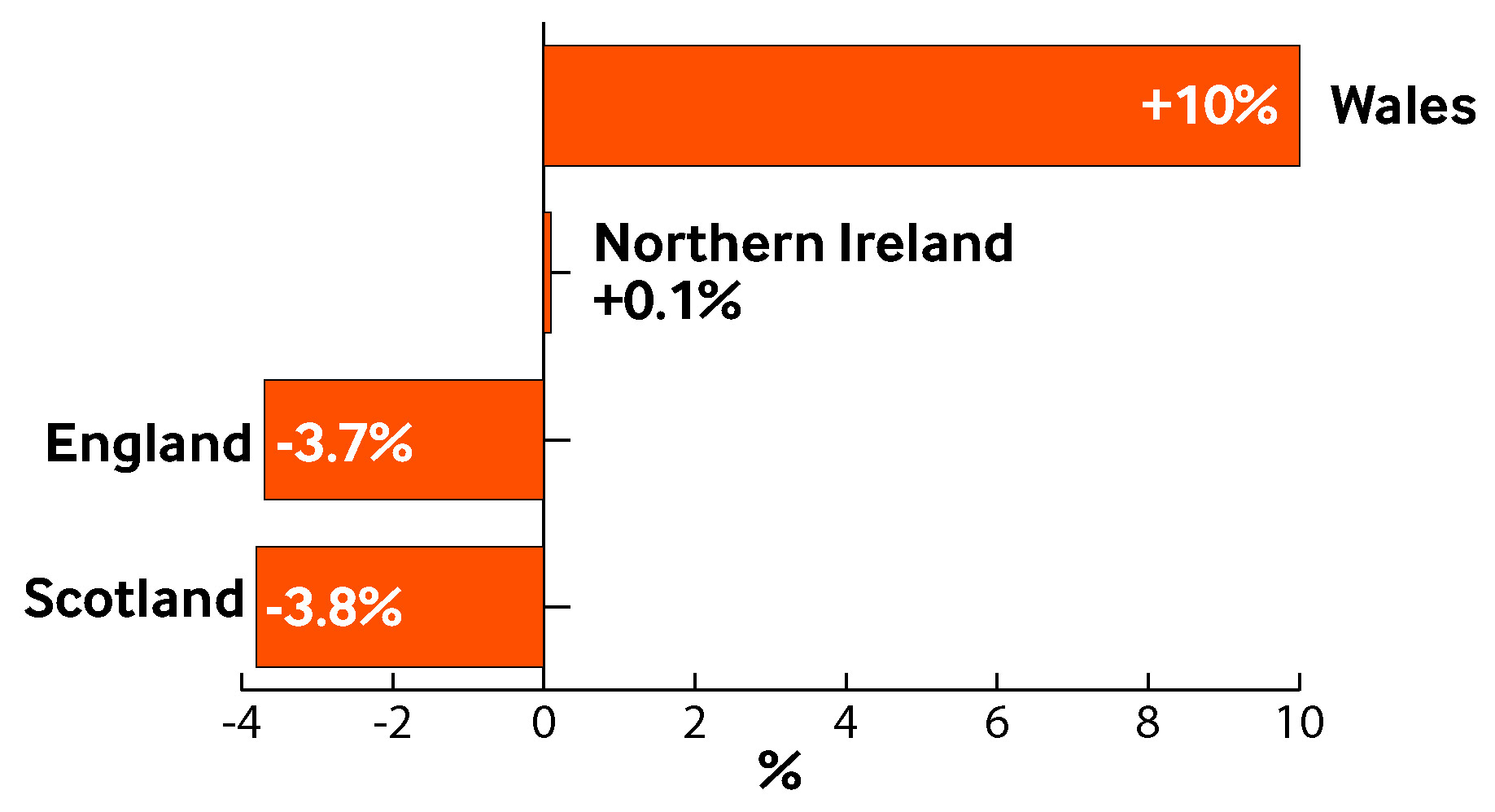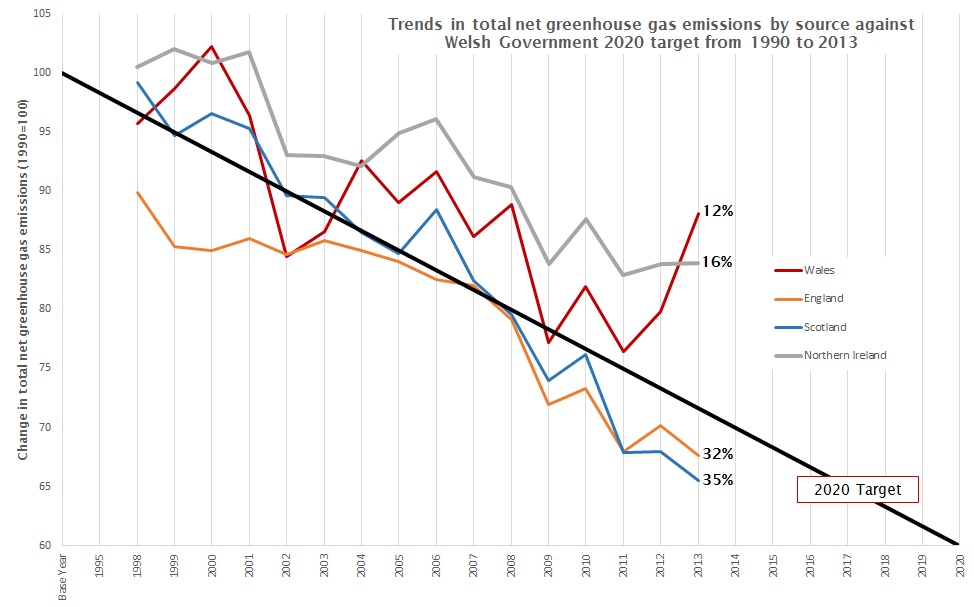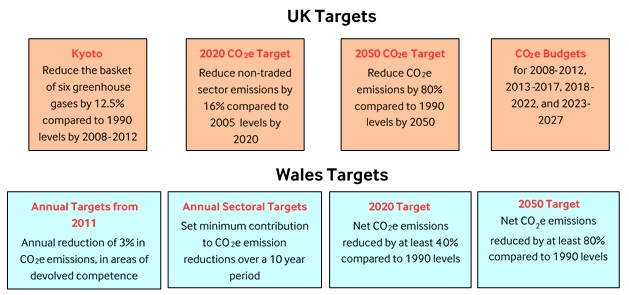Article by David Millett, National Assembly for Wales Research Service
Total Greenhouse Gas Emissions (GHG) in Wales rose by 10% between 2012 and 2013. This blog article looks at the reasons for this increase, how Wales compares to the other UK Nations and how the Environment (Wales) Bill aims to tackle Greenhouse Gas Emissions. The Greenhouse Gas Inventories for England, Scotland, Wales and Northern Ireland: 1990 – 2013 were published on 9 June 2015. What caused the 10% increase in Wales? According to the inventories, the 10% increase seen in Wales is predominately driven by two factors in the industrial process and energy sectors. The report says that;
The 2012 to 2013 increase of emissions is predominately driven by an increase in emissions from the iron and steel sector due to the restart of Tata Steel’s Port Talbot No.4 Blast Furnace in February, 2013, and a shift from natural gas to coal use in power stations.
How does Wales compare to the rest of the UK? [caption id="" align="alignnone" width="682"] Percentage change between 2012 and 2013 by UK Nation[/caption] The 10% increase seen in Wales was significantly higher than the other UK Nations. Between 2012 and 2013 greenhouse gas emissions decreased by 3.8% in Scotland and 3.7% in England. Emissions in Northern Ireland rose slightly by 0.1%. The reductions seen in England and Scotland have been due to a shift to renewable forms of generation in the energy sector.
Percentage change between 2012 and 2013 by UK Nation[/caption] The 10% increase seen in Wales was significantly higher than the other UK Nations. Between 2012 and 2013 greenhouse gas emissions decreased by 3.8% in Scotland and 3.7% in England. Emissions in Northern Ireland rose slightly by 0.1%. The reductions seen in England and Scotland have been due to a shift to renewable forms of generation in the energy sector.
- [caption id="" align="alignnone" width="682"]
 Trends in total net greenhouse gas emissions by source against Welsh Government 2020 target from 1990 to 2013.[/caption]
Trends in total net greenhouse gas emissions by source against Welsh Government 2020 target from 1990 to 2013.[/caption]
Wales has seen a decrease of 12% in greenhouse gas emissions between the Base Year (1990 or 1995 depending on the emission) and 2013, which is less than the reductions seen in other parts of the UK over this period (England a 32% decrease, Scotland 35% and Northern Ireland 16%). What are the UK and Welsh targets for reducing emissions? The diagram below provides an overview of the targets the UK Government and Welsh Government have set to reduce greenhouse gas emissions up to 2050.  In order for Wales to meet its 2020 target, of reducing total greenhouse gas emissions by 40% below 1990 levels, emissions in Wales will need to be reduced by a further 28 percentage points between 2014 and 2020. How will the Environment (Wales) Bill impact on Greenhouse Gas Emission targets? The Environment (Wales) Bill is currently before the Assembly and should receive Royal Assent by late March 2016, before the end of the Fourth Assembly. In sections 29-31 of the Bill, the Welsh Government is proposing new duties on Welsh Ministers to ensure emissions are reduced and a new carbon budgeting method to measure progress towards reducing Greenhouse Gas Emissions which is outlined below:
In order for Wales to meet its 2020 target, of reducing total greenhouse gas emissions by 40% below 1990 levels, emissions in Wales will need to be reduced by a further 28 percentage points between 2014 and 2020. How will the Environment (Wales) Bill impact on Greenhouse Gas Emission targets? The Environment (Wales) Bill is currently before the Assembly and should receive Royal Assent by late March 2016, before the end of the Fourth Assembly. In sections 29-31 of the Bill, the Welsh Government is proposing new duties on Welsh Ministers to ensure emissions are reduced and a new carbon budgeting method to measure progress towards reducing Greenhouse Gas Emissions which is outlined below:
- Welsh Ministers must ensure that the net Welsh emissions account for the year 2050 is at least 80% lower than the baseline (1990 or 1995);
- Welsh Ministers must, by regulations, specify one or more years before 2050 as interim target years and set a maximum amount for the net Welsh emissions account for each interim target year expressed as a percentage below the baseline. This interim target is not given on the face of the Bill; and
- For each five year budgetary period from 2016-20 to 2046-50, the Welsh Ministers must by regulations set a maximum total amount for the net Welsh emissions account (known as a carbon budget). Welsh Ministers must ensure that Welsh net emissions do not exceed the carbon budget for that period.
It is not clear yet whether carbon budgets will replace the current annual targets, and if so how will progress against emission reduction will be reported in future.






